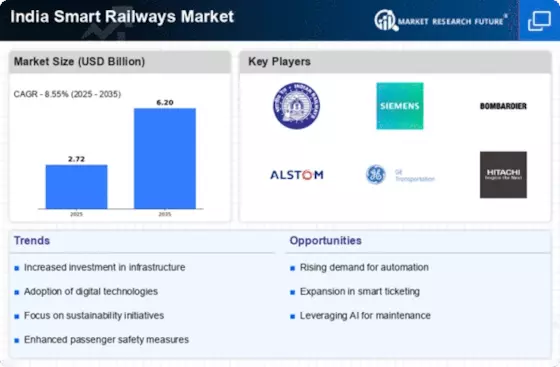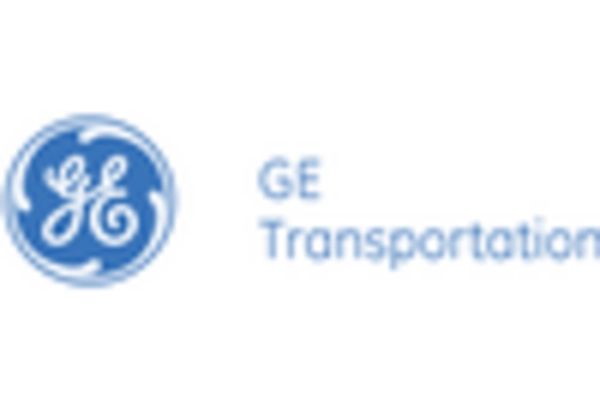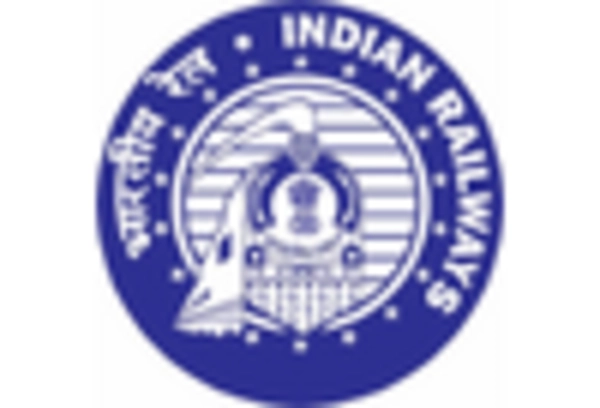Environmental Sustainability Goals
The emphasis on environmental sustainability is increasingly influencing the Smart Railways Market in India. The Indian government has set ambitious targets to reduce carbon emissions and promote green energy solutions within the transportation sector. The introduction of electric trains and solar-powered stations is part of a broader strategy to achieve a 33% reduction in carbon emissions by 2030. Investments in sustainable technologies are projected to reach INR 1 trillion, reflecting a commitment to eco-friendly practices. This focus on sustainability not only aligns with The Smart Railways Industry to environmentally conscious investors and consumers.
Government Initiatives and Investments
The Indian government has been actively promoting the Smart Railways Market through various initiatives and substantial investments. The National Rail Plan aims to create a future-ready railway system by 2030, with an estimated investment of over USD 130 billion. This plan emphasizes modernization, digitalization, and infrastructure upgrades, which are crucial for enhancing operational efficiency and passenger experience. Furthermore, the introduction of the Railway Safety Fund, with a budget allocation of INR 1.5 trillion, indicates a strong commitment to improving safety standards. These government initiatives not only bolster the Smart Railways Market but also attract private sector participation, thereby fostering innovation and technological advancements.
Enhanced Passenger Experience and Safety
Improving passenger experience and safety is a critical driver for the Smart Railways Market in India. The government has prioritized initiatives aimed at modernizing railway stations and enhancing onboard services. Projects such as the redevelopment of major railway stations into world-class facilities are underway, with investments exceeding INR 50,000 crore. Additionally, the introduction of smart ticketing systems and real-time information services aims to streamline the travel experience. Safety measures, including CCTV surveillance and upgraded emergency response systems, are also being implemented to ensure passenger security. These enhancements are likely to attract more users to the rail network, thereby stimulating growth in the Smart Railways Market.
Growing Urbanization and Population Density
India's rapid urbanization and increasing population density are driving the demand for efficient and smart railway solutions. With over 1.3 billion people, urban areas are experiencing significant pressure on existing transportation systems. The Smart Railways Market is poised to address these challenges by providing integrated transport solutions that enhance connectivity and reduce congestion. According to the Ministry of Railways, urban rail systems are expected to expand significantly, with investments projected to reach INR 2 trillion by 2025. This growth reflects the necessity for modernized rail infrastructure that can accommodate the rising commuter population while ensuring sustainability and efficiency.
Technological Advancements in Rail Infrastructure
The integration of advanced technologies in rail infrastructure is a pivotal driver for the Smart Railways Market in India. Innovations such as the implementation of the Train Collision Avoidance System (TCAS) and the use of Artificial Intelligence for predictive maintenance are transforming operational capabilities. The Indian Railways has allocated approximately INR 50,000 crore for technology upgrades, which includes the deployment of smart signaling systems and real-time tracking solutions. These advancements not only enhance safety and reliability but also improve the overall efficiency of rail operations, making the Smart Railways Market more attractive to stakeholders and investors.
















